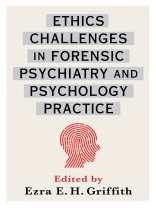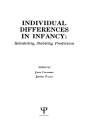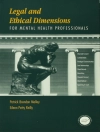Forensic psychiatry and psychology involve specialized practice with unique patients, including children, the incarcerated, and involuntary clients, presenting practitioners with specific ethics challenges. In this volume, Ezra E. H. Griffith offers a selection of engaging essays that guide practicing forensic specialists through particular situations that often result in ethics dilemmas.
In chapters covering topics such as forensic practice and critical feminist theory, neuroethics in court, work with asylum applicants, and ethics problems presented by the internet, the contributors demonstrate methods to help practitioners resolve problems that they are likely to encounter in forensic practice. The concentrated focus on thinking through ethics quandaries encourages forensic practitioners to reflect regularly on the ethics dimensions of their work and provides them with the tools to create ethics-based solutions that are transparent and understandable and best serve their clients. This essential book provides a roadmap for specialists in these evolving fields to recognize dilemmas through reflection and consideration, thoughtfully articulate the problems, and create solutions.
Tabla de materias
Introduction, by Ezra E. H. Griffith
Part I: Approaches to Solving Ethics Problems in Forensic Practice
1. Resolving Ethics Dilemmas in Forensic Practice, by William Connor Darby and Robert Weinstock
2. Feminism and Forensic Ethics, by Navneet Sidhu and Philip Candilis
3. Ethics Challenges for Forensic Practice in a Context of Limited Resources, by Maisha Emmanuel and Michael Campbell
4. On Wearing Two Hats: Ethics Challenges and Role Conflicts in Forensic Practice, by Rebecca Weintraub Brendel
5. Objectivity and Boundaries of Competence as Ethical Issues in Forensic Assessments, by Jennifer Cox and Stanley L. Brodsky
Part II: Ethics in Major Areas of Forensic Practice
6. Minors’ Autonomy in Forensic Child and Adolescent Practice, by Peter Ash
7. Ethics Dilemmas in Correctional Institutions, by Graham D. Glancy and Alexander Simpson
8. Forensic Ethics and Involuntary Outpatient Commitment, by Ezra E. H. Griffith and Daniel Papapietro
9. Neuroscience in Forensic Contexts: Ethical Concerns, by Stephen J. Morse
Part III: Specific Ethics Problems in Forensic Practice
10. Ethical Issues in the Use of Psychological Testing in Forensic Assessment, by Lori L. Hauser
11. Ethics and the Mandated Video Recording of Forensic Evaluations, by Richard Martinez and B. Thomas Gray
12. Current Ethics Dilemmas in the Assessment and Treatment of Sex Offenders, by Dominique Bourget and John Bradford
13. The Internet and Forensic Ethics, by Patricia R. Recupero and Frederick G. Reamer
14. Ethical Dilemmas in the Forensic Psychiatric Evaluation of Guantánamo Detainees Mass-Administered Mefloquine, by Remington L. Nevin and Elspeth Cameron Ritchie
15. Terrorism and National-Security Evaluations: Ethics Dilemmas in Forensic Practice, by Stephen N. Xenakis
16. Ethics and Forensic Specialists Interacting with the Media, by Brian K. Cooke
17. Ethical Dilemmas for Forensic Practitioners Working with Asylum Petitioners, by Chinmoy Gulrajani and Maya Prabhu
18. Addressing Ethics Dilemmas in Violence-Risk Assessment: A Forensic Psychologist Perspective, by Linda E. Weinberger and Shoba Sreenivasan
19. Forensic-Ethics Challenges in the Psychiatric Treatment of Children, by Thomas J. Mc Mahon and Christy Olezeski
20. Forensic Ethics and Clinical Collaborations Across Medical Specialties, by Christy Olezeski and Thomas J. Mc Mahon
List of Contributors
Index
Sobre el autor
Ezra E. H. Griffith is professor emeritus of psychiatry and African American studies at Yale University. He is editor of the
Journal of the American Academy of Psychiatry and the Law. He is the recipient of the Seymour Pollack Award and the American Psychiatric Association’s 2010 Isaac Ray Award for his distinguished achievements in forensic psychiatry.












